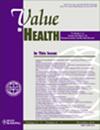健康技术评估中药物长期相对有效性的不确定性:比较脊髓肌肉萎缩症、囊性纤维化和高胆固醇血症药物的评估。
IF 4.9
2区 医学
Q1 ECONOMICS
引用次数: 0
摘要
目的:长期相对有效性的不确定性是药品卫生技术评估(HTA)中的一个重要因素。本研究调查了不同的 HTA 机构在评估中是如何处理这种不确定性的。方法:研究纳入了 6 个国家 HTA 机构的 49 份 HTA 报告,评估了脊髓性肌萎缩症、囊性纤维化和高胆固醇血症等 9 种药物。在这些报告中,按适应症级别进行了 81 项相对有效性评估 (REA) 和 45 项成本效益评估 (CEA)。我们收集了有关纳入试验、评估结果、长期有效性的不确定性、拟议的管理下进入协议(MEA)和重新评估的信息:结果:尽管各 HTA 机构采用的方法不同,但长期有效性的不确定性几乎是所有 CEA(91%)和四分之三 REA(74%)的重要考虑因素。由于时间和纳入标准的不同,各 HTA 机构所纳入的长期有效性数据的数量和类型也存在很大差异。总共提出了 23 项多边环境评估,其中 14 项与长期有效性的不确定性有关。此外,还进行了 13 次重新评估,其中 4 次由于获得了更多的长期有效性数据而增加了患者的可及性:结论:长期有效性的不确定性是 HTA 机构面临的一个重要挑战。结论:长期有效性的不确定性是 HTA 机构面临的重要挑战。各 HTA 机构在接受证据方面存在巨大差异,这导致了在将可用的长期有效性数据纳入决策方面的不一致性。在长期有效性存在较大不确定性的情况下,HTA 机构会采用基于结果的协议和重新评估,但不同的 HTA 机构和适应症会有不同的做法。本文章由计算机程序翻译,如有差异,请以英文原文为准。
Uncertainty in Long-Term Relative Effectiveness of Medicines in Health Technology Assessment
Objectives
Uncertainty regarding the long-term relative effectiveness is an important factor in health technology assessment (HTA) of medicines. This study investigated how different HTA bodies address this uncertainty in their assessments.
Methods
A total of 49 HTA reports from 6 national HTA bodies, assessing 9 medicines for spinal muscular atrophy, cystic fibrosis, and hypercholesterolemia, were included. In these reports, 81 relative effectiveness assessments and 45 cost-effectiveness assessments were performed on an indication level. We collected information on included trials, assessment outcomes, uncertainty regarding the long-term effectiveness, proposed managed entry agreements, and reassessments.
Results
Uncertainty regarding the long-term effectiveness was an important consideration in almost all cost-effectiveness assessments (91%) and three-quarters of relative effectiveness assessments (74%), despite differences in methodologies among HTA bodies. There were considerable differences in the amount and type of long-term effectiveness data included by HTA bodies due to timing and inclusion criteria. In total 23 managed entry agreements were proposed of which 14 were linked to uncertainty regarding the long-term effectiveness. In addition, 13 reassessments were performed of which 4 led to an increase in patient access because of more available long-term effectiveness data.
Conclusions
Uncertainty regarding the long-term effectiveness is an important challenge for HTA bodies. There are large differences in the acceptance of evidence among HTA bodies, which leads to heterogeneity in the inclusion of available long-term effectiveness data for decision making. In cases with large uncertainty regarding the long-term effectiveness, outcome-based agreements and reassessments are used by HTA bodies, but differently between HTA bodies and indications.
求助全文
通过发布文献求助,成功后即可免费获取论文全文。
去求助
来源期刊

Value in Health
医学-卫生保健
CiteScore
6.90
自引率
6.70%
发文量
3064
审稿时长
3-8 weeks
期刊介绍:
Value in Health contains original research articles for pharmacoeconomics, health economics, and outcomes research (clinical, economic, and patient-reported outcomes/preference-based research), as well as conceptual and health policy articles that provide valuable information for health care decision-makers as well as the research community. As the official journal of ISPOR, Value in Health provides a forum for researchers, as well as health care decision-makers to translate outcomes research into health care decisions.
 求助内容:
求助内容: 应助结果提醒方式:
应助结果提醒方式:


